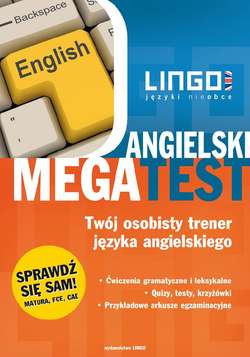Читать книгу Angielski. Megatest. Wersja mobilna - Anna Treger - Страница 19
На сайте Литреса книга снята с продажи.
1.13 Past Perfect
ОглавлениеCzas Past Perfect jest czasem zaprzeszłym. Stosuje się go, aby zaznaczyć uprzedniość danej czynności lub sytuacji przeszłej względem innej czynności lub sytuacji przeszłej.
W przeciwieństwie do zdań w Present Perfect, zdania w Past Perfect mogą zawierać konkretne określenia czasu, np. in 1998, on Saturday, when he returned, before she got married. Opisując wydarzenie przeszłe o jasnej chronologiczne kolejności, używa się Past Simple, a nie Past Perfect. W szczególności, gdy w wypowiedzi pojawiają się przyimki before czy after które wyraźnie określają pierwszeństwo i następstwo czasowe, stosowanie Past Perfect nie jest konieczne.
36 Ułóż zdania zgodnie z wzorem:
Klucz
Philip never saw koala bears. He went to Australia. (before)
Philip had never seen koala bears before he went to Australia.
I returned from hospital. Then I resumed swimming. (as soon as)
As soon as I had returned from hospital, I resumed swimming.
1. I finished cleaning the house. Then my parents came home. (by the time)
........................................................................................................................................
2. The dentist drilled my tooth. Then he filled it. (before)
........................................................................................................................................
3. I visited Sydney and Canberra. Then I moved to Australia with my family. (after)
........................................................................................................................................
4. I didn't see a waterfall. Then I visited Zambia. (before)
........................................................................................................................................
5. Peggy was confused. She didn't understand what I was asking for. (because)
........................................................................................................................................
6. The foreman left the site. Then the workers went to a canteen. (as soon as)
........................................................................................................................................
7. The children did the maths. Then they went out to play. (when)
........................................................................................................................................
37 Używając wyróżnionego słowa, ułóż drugie zdanie o podobnym znaczeniu, co pierwsze.
Klucz
1 Last year I went to an auction. It was my first time there. never I ................................................ auction before.
2 Robert wanted to study history. His parents talked him out of it. but Robert .............................................. his parents talked him out of it.
3 Lucy watered the houseplant. She got a phone call afterwards. already When ................................................ watered the houseplant.
4 I read most of the classic horror novels. I turned fifteen by the time. had By the time ................................................ classic horror novels.
5 That was the only time I wanted to come back to Europe. never I ................................................ Europe before.
6 Paul graduated from Oxford and then he joined the Labour Party. until Paul didn’t join ................................................ from Oxford.
7 I washed my hair before the alarm clock went off. when ................................................ my hair.
8 Garry arrived at the airport at 5. The plane took off at 5:10. by the time The plane ................................................ at the airport.
